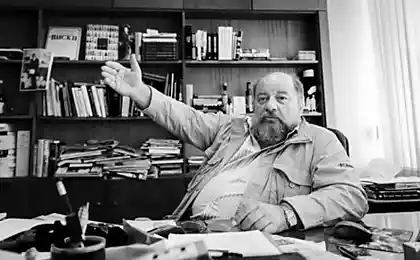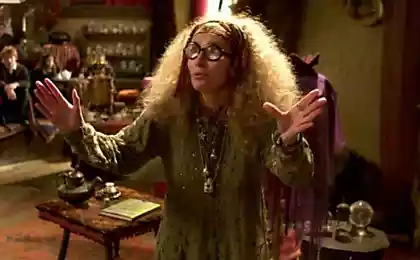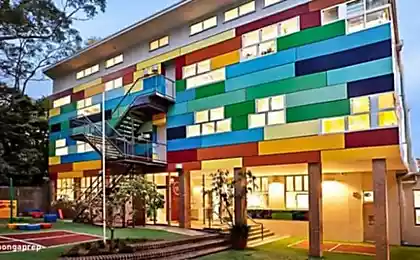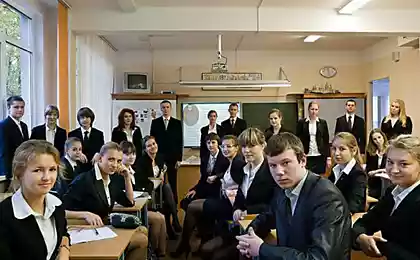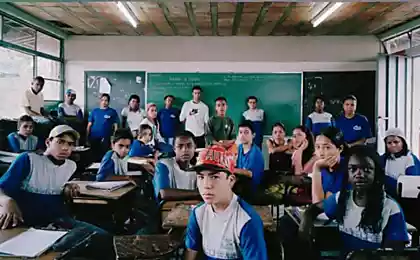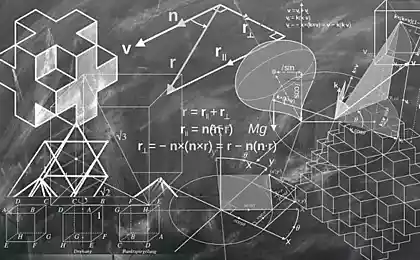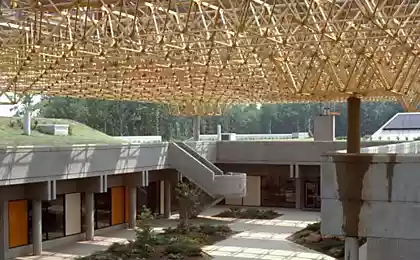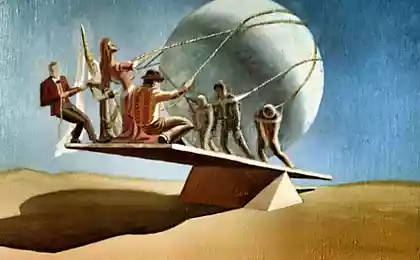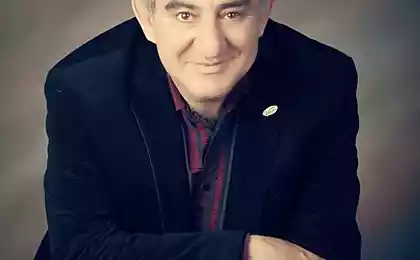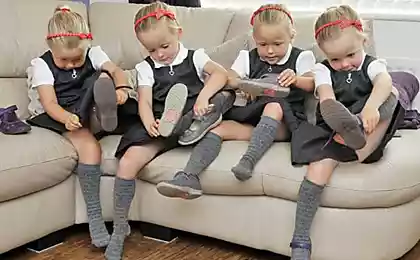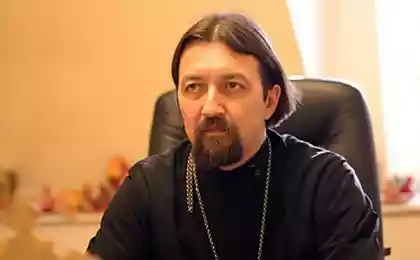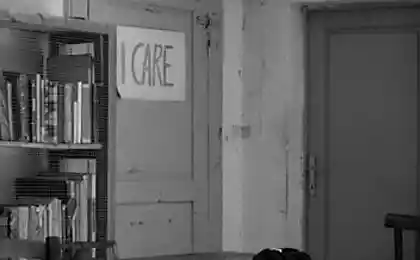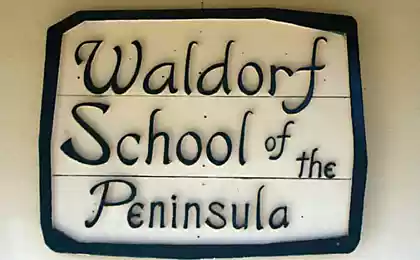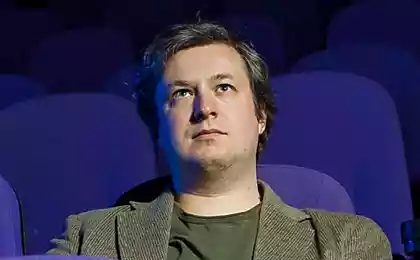435
About a school set on fire at six ends
Haven't you noticed it yet? School's dead. He died as an institution, as an important and necessary part of our lives.
No, technically it's still working. Millions of teachers will come to work on September one. Tens of millions of students with backpacks and bouquets of flowers will come to the classroom. But they will do this only by inertia.
There is no need for an institution called a school. Forget it. If you plan to educate your children, don’t count on school. Because there's only one semblance left of school, and it's going to melt like smoke in a couple or three years.
Don't you? Let's analyze it. Why do we send a child to school? To learn? Fire, thousands of ways of self-education – from fashionable mass distance courses a la “Khan Academy” to tutors who will prepare a hundred million times better, faster and more efficiently than a school in the yard.
Socialization, communication with peers? Pardon me, one normal summer camp will do more to socialize a child than eleven years of aimless thrust in the school hallways.
No, really, tell me why we need school today. What can she give that parents can not give, transferring the child to family education? Or extramural, external or distance? Yeah, well, nothing.
Putnam School, Boston, 1892 Source: Wikipedia
Today, mass school has only one advantage: it is “free.” Because any other form of education comes at a high cost. And not just financially. It is also “free” because it removes all responsibility. After sending a child to school, the average parent may not think about the outcome. “Let the professionals think. They get paid for it. Let them learn. Whatever.
What do you want? Who cares? You don't think about it. Built on the factory model of industrial society, our school by inertia drags into the XXI century the division of subjects, the class-lesson system and scoring certification. These are the sacred cows that you can’t encroach on because “this was the case with Grandma.”
Remember what serious passions arose when everyone was outraged by the draft standard, which divided all school subjects into compulsory and optional. Moreover, the first group included physical education, Basics of Life Safety, the course Russia in the World and an individual project, and mathematics, Russian and literature were optional. It was an attempt at revolutionary change in the school. I don't want to judge that project right now, but the outrage was so strong that most of the dissatisfied didn't even bother to read the draft standard. The school swayed, but it stood. It should be “like Grandma.”
Sometimes our school reminds me of a steampunk car. Who does not know, this is the direction of science fiction, modeling civilization, perfectly mastered the mechanics and technology of steam engines.
Let’s recall the film “Siberian Barber” and inventor Douglas McCracken. His giant car was amazing. This is our school. Huge, clumsy, puffing steam and sparkling with gold.
Steampunk is in many ways a "visual" genre - pair clubs, brilliant copper details, Victorian costumes ... It all looks very spectacular. That's just the efficiency of the locomotive - 4%.
Screenshot from the movie "Siberian Barber" Source: steampunker.ru
Our school looks a lot like this car. Created in the age of a pair, it is still carried along Russian (and not only) roads, getting bogged down in their impassable mud and methodically cutting tree after tree. A new forest grows behind, but the car does not stop.
Here is an excerpt from the manifesto "What "knowledge" is sold to us by a mass school" Family-type home school on Rossoshanka:
“The modern school emerged more than 300 years ago as a reaction to the new demands of machine manufacturing and has essentially not changed since then. The first owners of mines, manufactures, factories and factories found that people who had passed puberty and had previously engaged in agricultural labor or any kind of craft could hardly be turned into productive hands. The wind of bourgeois revolutions brought mass education. Naturally, such a mass school was tailored according to the factory model. The curriculum involved learning to read, write, and count, to which a little history, a little geography, and other subjects could be added. This has been and is being presented as the greatest blessing produced by industrial society. In backward Russia, the general elimination of illiteracy began with Bolshevik industrialization in the 20s of the twentieth century. Of course, this was not a charity of the new order – talk about the benefits of education served and serve only as a beautiful wrapper of the real product that the mass school sells us. In addition to the explicit curriculum, there has always been a hidden, real, detailed and main plan of education, namely: to teach obedience (how obedient a good machine is), to teach punctuality and correctness (how accurate, for example, a stamping machine) and to teach the performance of monotonous, monotonous work (which, in fact, is the strength of the machine).
However, steampunk is enough for our century. Because, as the old joke goes, "First, it's beautiful." And yet school is over. The school, like “Crow Slobodka” from the novel by I. Ilf and E. Petrov, is doomed. Remember?
The house was doomed. He couldn't help but burn. And indeed, at twelve o'clock in the morning he burst into flames, set on fire at six ends at once.
The utilities will burn down sooner or later. Source: i.obozrevatel
Let’s look at a few of these very endings.
The first end, perhaps, is money. I mentioned earlier that public school is free. It is free, of course, conditionally, because in recent years, parents have to pay out of their own pockets more and more “additional services”, which are rendered for the basic functions of the school. In principle, we are already used to this, and parents are willing to pay school for a good education. The bell, as always, came suddenly. Because in the last year, we started talking not about paying for additional services, but about the total lack of money of the school. Individual cases became a system and became its core. The state has no money for school. And it looks like it won't.
Alexander Adamsky wrote this best in his article “On the Edge”:
“A total lack of money is approaching school.
It is not customary to talk about this in government offices and meetings, and yet it is striking that even at the gathering of regional ministers in Vladivostok in early July, the impending financial school disaster was not mentioned by official speakers.
This is what the ministers were most concerned about.
Because in some regions the situation is close to critical, and the rest are waiting with fear for 2016.
All expenses, except salaries, are cut to the maximum. Regional education development programmes have been curtailed. Business trips are cancelled. Even the construction of kindergartens to reduce the queue of money is not enough.
Moreover, in Vladivostok, the Federal Minister announced his intention to recommend the abolition of the norm of 25 people in the classroom, while delicately silent about the reasons for this measure.
Well, let’s call them ourselves: on the one hand, officials need to report on the elimination of the second shift in schools, on the other – it will help to increase wages (since it is obvious that the load will increase). And under the noise, you can fire a couple of obstinate teachers at school, which will also improve the performance.
The shameful race for the implementation of roadmaps for the implementation of the May decrees turned into complete madness, into genuine financial hysteria.
It is possible to sum up the “intermediate result”: the “shagrenization” of money, the exorbitant centralization of its distribution, plus insanely rigid – even cruel – control over the implementation of petty regulations brought the system to the brink of chaos.
You think I'm thickening? Not at all. Read Adamsky's article. It sounds like a school requiem.
Is the school ready to work without money? I am also ready to recall much worse times when teachers were ready to work without pay. But then, in the mid-nineties, “freedom and uninhibited initiative gave strength and self-confidence.” Today, all eyes and prayers are turned exclusively upwards, and these aspirations can be replaced by indignation and aggression in the same direction.
In addition, the sharp deterioration looks wild and inexplicable: why and for what reason suddenly it was necessary to destroy the emerging system of financing and remuneration for results, which suddenly began to impose unification and isolation from the whole world instead of openness and variability?
The inexplicability of change for the worse, multiplied by unprecedented, almost prison-like administrative control and supervision, endless checks, and the terrifyingly anticipated financial crisis, have created a stifling moral climate in the school environment.” And that's where we came to the second end, which was also set on fire.
An over-centralized authoritarian system of control and petty supervision is killing the teacher.
Screenshot from the movie "The Process", 1962
And this is very serious. Because it's a shame they don't trust you. When they check every little thing and watch every stroke of the pen. The main quality you notice when you look at most teachers is fatigue. Fatigue from excessive load, from the next idiotic instructions, from constant checks, suspicions and instructions. And the main desire of a tired person is that everyone should get away from him, that he should not be obliged to think about anything and be responsible for anything.
“Come, scold, interview, grade, fill out the documentation. Comfortable? Comfortable. You are not looking for ways to achieve results, but honestly perform the ritual. You don't work, you serve.
School-service rolls up to the teacher in moments of decline. She whispers slylyly: “Do you need most of all?” There is a program, there is a timetable, there is a system of requirements for students, and if you follow methodological recommendations in everything, then what are your complaints? School service is incredibly kind to the teacher. It removes responsibility from him and shifts it to the child and the state. The results will be obviously unsatisfactory, but it is not the teacher who is responsible for them, but the authors of the programs and non-executive students. And you can calmly complain about stupid bosses, bad children and moral decay.
An enchanted circle. If you enter it and surrender to the current, it sucks. The more often you shift responsibility from yourself to objective circumstances, the worse things are; the worse things are, the greater your fatigue and irritation, the more you are inclined to follow the established mechanism. . . ?
I quoted an old (1998) article by Andrei Rusakov, a remarkable teacher and researcher of modern education. Then, almost twenty years ago, Andrei warned about the fork in which the Russian school found itself. We've been through that fork a long time. The tired teacher not only did not rest, but became a central figure.
Today, teacher fatigue can play a fatal role in school life. A tired teacher cannot really teach. Because learning is always an individual approach, it is always a game on the side of the child.
Small control forces the teacher to work with an eye. The teacher is not trusted. The teacher is always under suspicion. A step away from the implementation of the calendar is regarded as unsuitability. Who cares that children did not have time to master the topic and the situation requires to give another lesson beyond the proper? You can't. Violation. There are hundreds of parameters for which certification is carried out. Papers, diplomas. It's got everything except the kids. Nobody cares how you do your homework. You give a positive dynamic.
Worst of all, mindless inspections are carried out by bodies that do not understand the specifics of the educational process, but monitor compliance with the letter of the law.
Sergey Fomichev from Zarechny, Penza region, told me a couple of years ago at a pedagogical conference of the School League of Rusnano a very telling story: it turns out that teachers can now improve their skills only at their own expense. It’s bad, and it’s very bad for the school.
Explain the situation: The curriculum should be 100% complete. It's an invariant. If your lessons fall on March 8, May 1 – they should be held at another time. Their Lyceum The Prosecutor’s Office fined 50 thousand rubles for the fact that at the time of checking the records in the journal were behind the curriculum. Of course, this is solved relatively simply by notes. But what if the director takes a principled, law-abiding position?
Now to the point: F. teachers are sent to courses. If he goes to the regional center, then everything is fine: it is believed that he returns to school in the afternoon and conducts lessons. At least they can be recorded.
If he goes to our conference in St. Petersburg, then, of course, these days you can not record lessons — he has a business trip. The school can supply a replacement, but he's the only subject in the school. It is impossible to make an adequate replacement. There are two options: to put a “fake watch” and run into the inspection of the Prosecutor’s office, which picks up all the documents, including about the presence of the teacher at this time in another city, or by the end of the year to miss the hours under the program and again run into the inspection of the Prosecutor’s office.
The story told happened three years ago. Has the school situation improved since then?
Meanwhile, a good teacher knows that sometimes for pedagogical reasons he is simply obliged to break the instruction. I will no longer tell stories from my life, but I will give the floor to cosmonaut pilot Alexei Leonov. He told this story to a journalist of Rossiyskaya Gazeta the other day, when the thirty-year anniversary of the famous Soyuz-Apollo flight was celebrated.
Participants of the Soyuz-Apollo space company Source: RIA Novosti
Alexei Arkhipovich, are there still undisclosed secrets of the Soyuz-Apollo flight?
Alexey Leonov: Nope. One thing I haven't talked about in years. It was a scientific experiment involving the Apollo flyby of the Soyuz I was flying. There was a strict instruction: the distance between the ships is at least 150 meters.
Experts believed: the more, the safer. But it was clear from the practice of flying, both myself and Tom Stafford, the commander of the Apollo, that this distance was unacceptable because of the increased fuel consumption. Double flights are best performed at a distance of 40 meters.
And that's the question being discussed. Tom proves that you should fly at a distance of 35-40 meters. Worth dying. Specialists, too. The situation is tense to the limit. I'm being called from the simulator. Realizing what was going on, I took a leadership position, which angered Tom. Stafford's position can only hurt. Pulled him out of the meeting into the hallway. I said, "Calm down." We'll be alone in space. Let's do the right thing.”
You did?
Alexey Leonov: Sure! I flew around the Soyuz 40 meters from Apollo. I saw the face of pilot Vance Brand in the window. So far, no one has even thought to know, how did we fly? At what distance?
I spoke recently at the Space Summit in Houston. NASA technical director Glenn Lanny was also present. I said, I'll tell you a secret: I'm sorry, we broke all the instructions. But they did a brilliant experiment.” Sometimes it is necessary to take actions that cannot be described by instructions. They are born only in the process of exploitation.”
Is today’s teacher willing to “take actions that cannot be described by instruction?” Probably not yet. But once the last teacher who is ready to “take over” the school leaves, the school will die. The third end from which the school was set on fire is very connected to the second. Information technology has shown that education is not about what we thought: not about information and not even about knowledge-skills. It turned out that the essence of education is in a special kind of relationship. This is what the child comes to school for. For them, he's willing to put up with all this bedlam at school.
Screenshot from the film "Republic of Shkid", 1966
The child comes to the Master. So what would he come for if there were only tired people in the school building, following hundreds of circulars and instructions?
At the same time, the child has access to the Internet, in which he can ignite from the speakers of the TED conference, imbue with the ideas of programming on Hour of Code actions, perform a training project in GlobalLab together with peers from different countries.
These things carry drive, charge with what children call fun. This is something that modern schools cannot do.
School displaces bright people, they do not fit into the very petty system in which there is no place for creative initiative. Yes, they themselves will escape from a place in which, in the words of Adamsky, “a suffocating moral climate” reigns.
At one time, a single lesson in the 10th grade was conducted by a wonderful teacher E. N. Ilyin. It so happened that he came to our school to teach literature, but something did not suit him, and he “trusted” us first to his wife and then to his student. But I remember that lesson for the rest of my life. And then, the worst thing that ever happened to me was that it was all over the place. It turned out that literature is not the memorization of critical articles about boring “images of a new man” and “rays of light in the dark realm.” It turned out that these dull volumes from the school curriculum are not at all sad and corruptible, as I thought all the past 10 years of study. Yes, imagine, I managed to live to graduate school and not get a taste of Russian literature. But then everything turned around.
When I first came to his class, I laughed. I had fun looking at this man who was gesticulating around the classroom. His voice exploded and subsided in order to fly over the classroom again. But that's what attracts me to him. He makes you listen, even when you don't want to.
“Leaving school, what can I say about literature lessons?”
His whole life is a struggle for attention. Not for discipline, not for silence in class - for attention. But isn’t there a struggle going on in the whole school, in the arts, and all over the world today for people’s attention? Ilyin talks only about his class, but gets into the nerve of modernity.
To this astounding question of accuracy and simplicity - how to win the attention of students - Ilyin answers with the same unexpected simplicity. He says that the lesson of literature should be built by the same means as a work of art. The children are attentive and active, “when they are spoken with the language of unexpected techniques, accurate details, burning questions ... in a word, the language of art.” Reception, detail and question - in these three words all Ilyin. The books you study in class are different. Can literature classes be the same even in form? No, the literature teacher is like Plyushkin with a huge bunch of keys. For each lesson, for each writer, hero, for each topic - its reception, its key. Open the door, not break into it! The creative method is “the core of the modern lesson, its main tool, the thing by which every lesson is remembered, in all its volume and – all”.
This is an excerpt from Simon Soloveychyk’s article “The Verbalist Ilyin”, published in Komsomolskaya Pravda in 1977.
The famous photo of innovative teachers, which captured them in Peredelkino in 1986. Source: 1september.ru
The quote given at the beginning is not from my writing. But I could have written the same words about Master. Because one lesson with E. N. Ilyin turned my life around. One lesson.
Would Ilyin come to school today? He can give a lesson to the potatoes that Pierre and Karataev ate, cover only these potatoes and say the deepest problems of War and Peace, and I will probably give a difficult task to the reader, even if he teaches literature, when I ask: could you talk for twenty minutes about why Raskolnikov has an axe loop on the left side of his coat?
I don't know about you, but I've got a shadow of a prosecutor's office somewhere.
But then, apparently, there were other times in the country.
“I was late for the train, so I took the writings of the graduates with me. In today's issue of the newspaper, the teacher will read them for the first time. “Oh, what happiness for me and for all of us that teaches us literature Yevgeny Nikolaevich!” – said in one essay. “Meeting such a literature teacher I consider just a happy occasion in my life,” said another. “When I leave school, I am satisfied with my literature teacher,” says the third. This is Simon Solowayczyk again. Does he write about our school?
I listed the three ends from which our school was set on fire today. I won't write about the other three. I'll name them succinctly.
First of all, the overregulation of the school as an institution. Even now, a person cannot work in school without pedagogical education. Is that good? Grigory Tarasevich, head of the Summer School of Journalism, is very fond of answering the question: “Will I be able to work as a journalist without having a special education?”
It is very difficult, almost impossible, you need a lot of study and retraining in order to become a journalist, if you already have a special journalistic education.
This is an important point. We don't need amateurs. But only amateurs can make a breakthrough. The Ark was built by an amateur, the professionals built the Titanic. We're building the Titanic.
The next is the belief that, having done certain actions, we will inevitably get an educated person out. The mechanistic approach to learning has ruined many. We are sure that once found practice will work everywhere and always. That a good lesson can be repeated over and over again. But kids aren't dumb. What lies perfectly in the head of one, can safely fly away from the other.
And finally, the last one. We often believe that school is everything. That she possesses the mind of the students, that the word of the teacher is cast in granite and remembered forever.
It's a myth.
Here is a short excerpt from Tubelsky’s book “School of the Future Built with Children”.
Korczak:
Of course, I cannot make an oak tree out of birch, a vine out of oak. Same with the kids. The only thing I can do is create a ground around them so that they understand something about themselves, so that they can change. But I can't turn one into the other.
Ushinsky:
No teacher, no matter how unrelenting and extensive his activity, can positively direct all the spiritual activity of even a few pupils. He must therefore surround them with a sphere in which they could easily find activity, if not useful, then at least not harmful.
Tubelski:
That's a very important point. The teacher, the educator should not try to fill the entire space of the child’s development. He should ensure that the school is a system of the most saturated, culturally consistent spaces, where the child could know himself and interact with other people. It is especially important to try to create such a school for teenagers.
(Seen by the author on Facebook, on the page of the director of the Elizabethan Gymnasium Vladimir Pogodin)
But I don’t think I’m going to explain these three things. Bye. Because I have hope that the school will survive.
Otherwise, I wouldn’t be in school myself. And yet, on September 1, I will meet with 1.86 million other teachers again at the school doorstep and say, "Hello, miss you?"
And even if they lie back, I know the truth. School's not going anywhere. Because school is not walls or stupid instructions. School is a teacher. As Ivan Travkin puts it, “School is where the teacher is.”
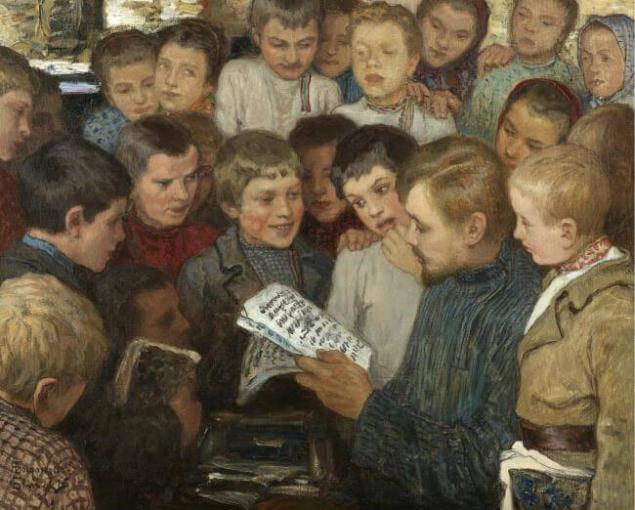
N. P. Bogdanov-Belsky. "Rural School," 1890s. Source: Wikipedia
School walls can burn, collapse or dissolve. There will always be a need for a teacher. There will inevitably be a school around the teacher.
The greatest misunderstanding of our time is the belief that school is the steampunk machine. Building, lessons, schedule, grades. Teachers and supervisors, officials and inspectors. I think that’s what school is.
But it's not. The space of the school is actually the entire space of the city in which we live. “School is a place for learning – a place where they teach, not just learn,” Travkin said. The school is not tied to the place, to the infrastructure. A teacher can turn any place into a school, it is only important to turn the experience of interaction with the surrounding space into the content of the educational situation.
“Translating experience into the content of the learning situation is one aspect of the role of the teacher in the media city, the second is the support of social practices that create places for learning, i.e. places where he could reproduce and develop learning situations. Mobility does not mean that the school is everywhere, but that the school follows the teacher: using media services and taking into account the context of “border” places, it can influence information flows by implementing the learning process, or create the opportunity for such implementation.
But it follows that any student can become a teacher. And more than that, it has to be. For my family, friends, colleagues. We are all teachers and students in the same chain. Nodes of the network, which, depending on the situation, can both teach and learn.
There's no one smarter than everyone else. Who's wise? Someone who learns from everyone.
But that seems to mean only one thing. Is school not doomed?
Author: Anatoly Sperch
P.S. And remember, just by changing your consciousness – together we change the world!
Join us on Facebook, VKontakte, Odnoklasniki
Source: newtonew.com/discussions/school-voronya-slobodka
No, technically it's still working. Millions of teachers will come to work on September one. Tens of millions of students with backpacks and bouquets of flowers will come to the classroom. But they will do this only by inertia.
There is no need for an institution called a school. Forget it. If you plan to educate your children, don’t count on school. Because there's only one semblance left of school, and it's going to melt like smoke in a couple or three years.
Don't you? Let's analyze it. Why do we send a child to school? To learn? Fire, thousands of ways of self-education – from fashionable mass distance courses a la “Khan Academy” to tutors who will prepare a hundred million times better, faster and more efficiently than a school in the yard.
Socialization, communication with peers? Pardon me, one normal summer camp will do more to socialize a child than eleven years of aimless thrust in the school hallways.
No, really, tell me why we need school today. What can she give that parents can not give, transferring the child to family education? Or extramural, external or distance? Yeah, well, nothing.
Putnam School, Boston, 1892 Source: Wikipedia
Today, mass school has only one advantage: it is “free.” Because any other form of education comes at a high cost. And not just financially. It is also “free” because it removes all responsibility. After sending a child to school, the average parent may not think about the outcome. “Let the professionals think. They get paid for it. Let them learn. Whatever.
What do you want? Who cares? You don't think about it. Built on the factory model of industrial society, our school by inertia drags into the XXI century the division of subjects, the class-lesson system and scoring certification. These are the sacred cows that you can’t encroach on because “this was the case with Grandma.”
Remember what serious passions arose when everyone was outraged by the draft standard, which divided all school subjects into compulsory and optional. Moreover, the first group included physical education, Basics of Life Safety, the course Russia in the World and an individual project, and mathematics, Russian and literature were optional. It was an attempt at revolutionary change in the school. I don't want to judge that project right now, but the outrage was so strong that most of the dissatisfied didn't even bother to read the draft standard. The school swayed, but it stood. It should be “like Grandma.”
Sometimes our school reminds me of a steampunk car. Who does not know, this is the direction of science fiction, modeling civilization, perfectly mastered the mechanics and technology of steam engines.
Let’s recall the film “Siberian Barber” and inventor Douglas McCracken. His giant car was amazing. This is our school. Huge, clumsy, puffing steam and sparkling with gold.
Steampunk is in many ways a "visual" genre - pair clubs, brilliant copper details, Victorian costumes ... It all looks very spectacular. That's just the efficiency of the locomotive - 4%.
Screenshot from the movie "Siberian Barber" Source: steampunker.ru
Our school looks a lot like this car. Created in the age of a pair, it is still carried along Russian (and not only) roads, getting bogged down in their impassable mud and methodically cutting tree after tree. A new forest grows behind, but the car does not stop.
Here is an excerpt from the manifesto "What "knowledge" is sold to us by a mass school" Family-type home school on Rossoshanka:
“The modern school emerged more than 300 years ago as a reaction to the new demands of machine manufacturing and has essentially not changed since then. The first owners of mines, manufactures, factories and factories found that people who had passed puberty and had previously engaged in agricultural labor or any kind of craft could hardly be turned into productive hands. The wind of bourgeois revolutions brought mass education. Naturally, such a mass school was tailored according to the factory model. The curriculum involved learning to read, write, and count, to which a little history, a little geography, and other subjects could be added. This has been and is being presented as the greatest blessing produced by industrial society. In backward Russia, the general elimination of illiteracy began with Bolshevik industrialization in the 20s of the twentieth century. Of course, this was not a charity of the new order – talk about the benefits of education served and serve only as a beautiful wrapper of the real product that the mass school sells us. In addition to the explicit curriculum, there has always been a hidden, real, detailed and main plan of education, namely: to teach obedience (how obedient a good machine is), to teach punctuality and correctness (how accurate, for example, a stamping machine) and to teach the performance of monotonous, monotonous work (which, in fact, is the strength of the machine).
However, steampunk is enough for our century. Because, as the old joke goes, "First, it's beautiful." And yet school is over. The school, like “Crow Slobodka” from the novel by I. Ilf and E. Petrov, is doomed. Remember?
The house was doomed. He couldn't help but burn. And indeed, at twelve o'clock in the morning he burst into flames, set on fire at six ends at once.
The utilities will burn down sooner or later. Source: i.obozrevatel
Let’s look at a few of these very endings.
The first end, perhaps, is money. I mentioned earlier that public school is free. It is free, of course, conditionally, because in recent years, parents have to pay out of their own pockets more and more “additional services”, which are rendered for the basic functions of the school. In principle, we are already used to this, and parents are willing to pay school for a good education. The bell, as always, came suddenly. Because in the last year, we started talking not about paying for additional services, but about the total lack of money of the school. Individual cases became a system and became its core. The state has no money for school. And it looks like it won't.
Alexander Adamsky wrote this best in his article “On the Edge”:
“A total lack of money is approaching school.
It is not customary to talk about this in government offices and meetings, and yet it is striking that even at the gathering of regional ministers in Vladivostok in early July, the impending financial school disaster was not mentioned by official speakers.
This is what the ministers were most concerned about.
Because in some regions the situation is close to critical, and the rest are waiting with fear for 2016.
All expenses, except salaries, are cut to the maximum. Regional education development programmes have been curtailed. Business trips are cancelled. Even the construction of kindergartens to reduce the queue of money is not enough.
Moreover, in Vladivostok, the Federal Minister announced his intention to recommend the abolition of the norm of 25 people in the classroom, while delicately silent about the reasons for this measure.
Well, let’s call them ourselves: on the one hand, officials need to report on the elimination of the second shift in schools, on the other – it will help to increase wages (since it is obvious that the load will increase). And under the noise, you can fire a couple of obstinate teachers at school, which will also improve the performance.
The shameful race for the implementation of roadmaps for the implementation of the May decrees turned into complete madness, into genuine financial hysteria.
It is possible to sum up the “intermediate result”: the “shagrenization” of money, the exorbitant centralization of its distribution, plus insanely rigid – even cruel – control over the implementation of petty regulations brought the system to the brink of chaos.
You think I'm thickening? Not at all. Read Adamsky's article. It sounds like a school requiem.
Is the school ready to work without money? I am also ready to recall much worse times when teachers were ready to work without pay. But then, in the mid-nineties, “freedom and uninhibited initiative gave strength and self-confidence.” Today, all eyes and prayers are turned exclusively upwards, and these aspirations can be replaced by indignation and aggression in the same direction.
In addition, the sharp deterioration looks wild and inexplicable: why and for what reason suddenly it was necessary to destroy the emerging system of financing and remuneration for results, which suddenly began to impose unification and isolation from the whole world instead of openness and variability?
The inexplicability of change for the worse, multiplied by unprecedented, almost prison-like administrative control and supervision, endless checks, and the terrifyingly anticipated financial crisis, have created a stifling moral climate in the school environment.” And that's where we came to the second end, which was also set on fire.
An over-centralized authoritarian system of control and petty supervision is killing the teacher.
Screenshot from the movie "The Process", 1962
And this is very serious. Because it's a shame they don't trust you. When they check every little thing and watch every stroke of the pen. The main quality you notice when you look at most teachers is fatigue. Fatigue from excessive load, from the next idiotic instructions, from constant checks, suspicions and instructions. And the main desire of a tired person is that everyone should get away from him, that he should not be obliged to think about anything and be responsible for anything.
“Come, scold, interview, grade, fill out the documentation. Comfortable? Comfortable. You are not looking for ways to achieve results, but honestly perform the ritual. You don't work, you serve.
School-service rolls up to the teacher in moments of decline. She whispers slylyly: “Do you need most of all?” There is a program, there is a timetable, there is a system of requirements for students, and if you follow methodological recommendations in everything, then what are your complaints? School service is incredibly kind to the teacher. It removes responsibility from him and shifts it to the child and the state. The results will be obviously unsatisfactory, but it is not the teacher who is responsible for them, but the authors of the programs and non-executive students. And you can calmly complain about stupid bosses, bad children and moral decay.
An enchanted circle. If you enter it and surrender to the current, it sucks. The more often you shift responsibility from yourself to objective circumstances, the worse things are; the worse things are, the greater your fatigue and irritation, the more you are inclined to follow the established mechanism. . . ?
I quoted an old (1998) article by Andrei Rusakov, a remarkable teacher and researcher of modern education. Then, almost twenty years ago, Andrei warned about the fork in which the Russian school found itself. We've been through that fork a long time. The tired teacher not only did not rest, but became a central figure.
Today, teacher fatigue can play a fatal role in school life. A tired teacher cannot really teach. Because learning is always an individual approach, it is always a game on the side of the child.
Small control forces the teacher to work with an eye. The teacher is not trusted. The teacher is always under suspicion. A step away from the implementation of the calendar is regarded as unsuitability. Who cares that children did not have time to master the topic and the situation requires to give another lesson beyond the proper? You can't. Violation. There are hundreds of parameters for which certification is carried out. Papers, diplomas. It's got everything except the kids. Nobody cares how you do your homework. You give a positive dynamic.
Worst of all, mindless inspections are carried out by bodies that do not understand the specifics of the educational process, but monitor compliance with the letter of the law.
Sergey Fomichev from Zarechny, Penza region, told me a couple of years ago at a pedagogical conference of the School League of Rusnano a very telling story: it turns out that teachers can now improve their skills only at their own expense. It’s bad, and it’s very bad for the school.
Explain the situation: The curriculum should be 100% complete. It's an invariant. If your lessons fall on March 8, May 1 – they should be held at another time. Their Lyceum The Prosecutor’s Office fined 50 thousand rubles for the fact that at the time of checking the records in the journal were behind the curriculum. Of course, this is solved relatively simply by notes. But what if the director takes a principled, law-abiding position?
Now to the point: F. teachers are sent to courses. If he goes to the regional center, then everything is fine: it is believed that he returns to school in the afternoon and conducts lessons. At least they can be recorded.
If he goes to our conference in St. Petersburg, then, of course, these days you can not record lessons — he has a business trip. The school can supply a replacement, but he's the only subject in the school. It is impossible to make an adequate replacement. There are two options: to put a “fake watch” and run into the inspection of the Prosecutor’s office, which picks up all the documents, including about the presence of the teacher at this time in another city, or by the end of the year to miss the hours under the program and again run into the inspection of the Prosecutor’s office.
The story told happened three years ago. Has the school situation improved since then?
Meanwhile, a good teacher knows that sometimes for pedagogical reasons he is simply obliged to break the instruction. I will no longer tell stories from my life, but I will give the floor to cosmonaut pilot Alexei Leonov. He told this story to a journalist of Rossiyskaya Gazeta the other day, when the thirty-year anniversary of the famous Soyuz-Apollo flight was celebrated.
Participants of the Soyuz-Apollo space company Source: RIA Novosti
Alexei Arkhipovich, are there still undisclosed secrets of the Soyuz-Apollo flight?
Alexey Leonov: Nope. One thing I haven't talked about in years. It was a scientific experiment involving the Apollo flyby of the Soyuz I was flying. There was a strict instruction: the distance between the ships is at least 150 meters.
Experts believed: the more, the safer. But it was clear from the practice of flying, both myself and Tom Stafford, the commander of the Apollo, that this distance was unacceptable because of the increased fuel consumption. Double flights are best performed at a distance of 40 meters.
And that's the question being discussed. Tom proves that you should fly at a distance of 35-40 meters. Worth dying. Specialists, too. The situation is tense to the limit. I'm being called from the simulator. Realizing what was going on, I took a leadership position, which angered Tom. Stafford's position can only hurt. Pulled him out of the meeting into the hallway. I said, "Calm down." We'll be alone in space. Let's do the right thing.”
You did?
Alexey Leonov: Sure! I flew around the Soyuz 40 meters from Apollo. I saw the face of pilot Vance Brand in the window. So far, no one has even thought to know, how did we fly? At what distance?
I spoke recently at the Space Summit in Houston. NASA technical director Glenn Lanny was also present. I said, I'll tell you a secret: I'm sorry, we broke all the instructions. But they did a brilliant experiment.” Sometimes it is necessary to take actions that cannot be described by instructions. They are born only in the process of exploitation.”
Is today’s teacher willing to “take actions that cannot be described by instruction?” Probably not yet. But once the last teacher who is ready to “take over” the school leaves, the school will die. The third end from which the school was set on fire is very connected to the second. Information technology has shown that education is not about what we thought: not about information and not even about knowledge-skills. It turned out that the essence of education is in a special kind of relationship. This is what the child comes to school for. For them, he's willing to put up with all this bedlam at school.
Screenshot from the film "Republic of Shkid", 1966
The child comes to the Master. So what would he come for if there were only tired people in the school building, following hundreds of circulars and instructions?
At the same time, the child has access to the Internet, in which he can ignite from the speakers of the TED conference, imbue with the ideas of programming on Hour of Code actions, perform a training project in GlobalLab together with peers from different countries.
These things carry drive, charge with what children call fun. This is something that modern schools cannot do.
School displaces bright people, they do not fit into the very petty system in which there is no place for creative initiative. Yes, they themselves will escape from a place in which, in the words of Adamsky, “a suffocating moral climate” reigns.
At one time, a single lesson in the 10th grade was conducted by a wonderful teacher E. N. Ilyin. It so happened that he came to our school to teach literature, but something did not suit him, and he “trusted” us first to his wife and then to his student. But I remember that lesson for the rest of my life. And then, the worst thing that ever happened to me was that it was all over the place. It turned out that literature is not the memorization of critical articles about boring “images of a new man” and “rays of light in the dark realm.” It turned out that these dull volumes from the school curriculum are not at all sad and corruptible, as I thought all the past 10 years of study. Yes, imagine, I managed to live to graduate school and not get a taste of Russian literature. But then everything turned around.
When I first came to his class, I laughed. I had fun looking at this man who was gesticulating around the classroom. His voice exploded and subsided in order to fly over the classroom again. But that's what attracts me to him. He makes you listen, even when you don't want to.
“Leaving school, what can I say about literature lessons?”
His whole life is a struggle for attention. Not for discipline, not for silence in class - for attention. But isn’t there a struggle going on in the whole school, in the arts, and all over the world today for people’s attention? Ilyin talks only about his class, but gets into the nerve of modernity.
To this astounding question of accuracy and simplicity - how to win the attention of students - Ilyin answers with the same unexpected simplicity. He says that the lesson of literature should be built by the same means as a work of art. The children are attentive and active, “when they are spoken with the language of unexpected techniques, accurate details, burning questions ... in a word, the language of art.” Reception, detail and question - in these three words all Ilyin. The books you study in class are different. Can literature classes be the same even in form? No, the literature teacher is like Plyushkin with a huge bunch of keys. For each lesson, for each writer, hero, for each topic - its reception, its key. Open the door, not break into it! The creative method is “the core of the modern lesson, its main tool, the thing by which every lesson is remembered, in all its volume and – all”.
This is an excerpt from Simon Soloveychyk’s article “The Verbalist Ilyin”, published in Komsomolskaya Pravda in 1977.
The famous photo of innovative teachers, which captured them in Peredelkino in 1986. Source: 1september.ru
The quote given at the beginning is not from my writing. But I could have written the same words about Master. Because one lesson with E. N. Ilyin turned my life around. One lesson.
Would Ilyin come to school today? He can give a lesson to the potatoes that Pierre and Karataev ate, cover only these potatoes and say the deepest problems of War and Peace, and I will probably give a difficult task to the reader, even if he teaches literature, when I ask: could you talk for twenty minutes about why Raskolnikov has an axe loop on the left side of his coat?
I don't know about you, but I've got a shadow of a prosecutor's office somewhere.
But then, apparently, there were other times in the country.
“I was late for the train, so I took the writings of the graduates with me. In today's issue of the newspaper, the teacher will read them for the first time. “Oh, what happiness for me and for all of us that teaches us literature Yevgeny Nikolaevich!” – said in one essay. “Meeting such a literature teacher I consider just a happy occasion in my life,” said another. “When I leave school, I am satisfied with my literature teacher,” says the third. This is Simon Solowayczyk again. Does he write about our school?
I listed the three ends from which our school was set on fire today. I won't write about the other three. I'll name them succinctly.
First of all, the overregulation of the school as an institution. Even now, a person cannot work in school without pedagogical education. Is that good? Grigory Tarasevich, head of the Summer School of Journalism, is very fond of answering the question: “Will I be able to work as a journalist without having a special education?”
It is very difficult, almost impossible, you need a lot of study and retraining in order to become a journalist, if you already have a special journalistic education.
This is an important point. We don't need amateurs. But only amateurs can make a breakthrough. The Ark was built by an amateur, the professionals built the Titanic. We're building the Titanic.
The next is the belief that, having done certain actions, we will inevitably get an educated person out. The mechanistic approach to learning has ruined many. We are sure that once found practice will work everywhere and always. That a good lesson can be repeated over and over again. But kids aren't dumb. What lies perfectly in the head of one, can safely fly away from the other.
And finally, the last one. We often believe that school is everything. That she possesses the mind of the students, that the word of the teacher is cast in granite and remembered forever.
It's a myth.
Here is a short excerpt from Tubelsky’s book “School of the Future Built with Children”.
Korczak:
Of course, I cannot make an oak tree out of birch, a vine out of oak. Same with the kids. The only thing I can do is create a ground around them so that they understand something about themselves, so that they can change. But I can't turn one into the other.
Ushinsky:
No teacher, no matter how unrelenting and extensive his activity, can positively direct all the spiritual activity of even a few pupils. He must therefore surround them with a sphere in which they could easily find activity, if not useful, then at least not harmful.
Tubelski:
That's a very important point. The teacher, the educator should not try to fill the entire space of the child’s development. He should ensure that the school is a system of the most saturated, culturally consistent spaces, where the child could know himself and interact with other people. It is especially important to try to create such a school for teenagers.
(Seen by the author on Facebook, on the page of the director of the Elizabethan Gymnasium Vladimir Pogodin)
But I don’t think I’m going to explain these three things. Bye. Because I have hope that the school will survive.
Otherwise, I wouldn’t be in school myself. And yet, on September 1, I will meet with 1.86 million other teachers again at the school doorstep and say, "Hello, miss you?"
And even if they lie back, I know the truth. School's not going anywhere. Because school is not walls or stupid instructions. School is a teacher. As Ivan Travkin puts it, “School is where the teacher is.”

N. P. Bogdanov-Belsky. "Rural School," 1890s. Source: Wikipedia
School walls can burn, collapse or dissolve. There will always be a need for a teacher. There will inevitably be a school around the teacher.
The greatest misunderstanding of our time is the belief that school is the steampunk machine. Building, lessons, schedule, grades. Teachers and supervisors, officials and inspectors. I think that’s what school is.
But it's not. The space of the school is actually the entire space of the city in which we live. “School is a place for learning – a place where they teach, not just learn,” Travkin said. The school is not tied to the place, to the infrastructure. A teacher can turn any place into a school, it is only important to turn the experience of interaction with the surrounding space into the content of the educational situation.
“Translating experience into the content of the learning situation is one aspect of the role of the teacher in the media city, the second is the support of social practices that create places for learning, i.e. places where he could reproduce and develop learning situations. Mobility does not mean that the school is everywhere, but that the school follows the teacher: using media services and taking into account the context of “border” places, it can influence information flows by implementing the learning process, or create the opportunity for such implementation.
But it follows that any student can become a teacher. And more than that, it has to be. For my family, friends, colleagues. We are all teachers and students in the same chain. Nodes of the network, which, depending on the situation, can both teach and learn.
There's no one smarter than everyone else. Who's wise? Someone who learns from everyone.
But that seems to mean only one thing. Is school not doomed?
Author: Anatoly Sperch
P.S. And remember, just by changing your consciousness – together we change the world!
Join us on Facebook, VKontakte, Odnoklasniki
Source: newtonew.com/discussions/school-voronya-slobodka

